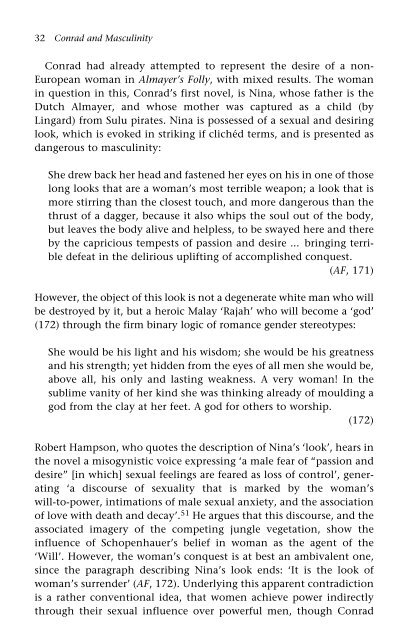Conrad and Masculinity
Conrad and Masculinity
Conrad and Masculinity
Create successful ePaper yourself
Turn your PDF publications into a flip-book with our unique Google optimized e-Paper software.
32 <strong>Conrad</strong> <strong>and</strong> <strong>Masculinity</strong><br />
<strong>Conrad</strong> had already attempted to represent the desire of a non-<br />
European woman in Almayer’s Folly, with mixed results. The woman<br />
in question in this, <strong>Conrad</strong>’s first novel, is Nina, whose father is the<br />
Dutch Almayer, <strong>and</strong> whose mother was captured as a child (by<br />
Lingard) from Sulu pirates. Nina is possessed of a sexual <strong>and</strong> desiring<br />
look, which is evoked in striking if clichéd terms, <strong>and</strong> is presented as<br />
dangerous to masculinity:<br />
She drew back her head <strong>and</strong> fastened her eyes on his in one of those<br />
long looks that are a woman’s most terrible weapon; a look that is<br />
more stirring than the closest touch, <strong>and</strong> more dangerous than the<br />
thrust of a dagger, because it also whips the soul out of the body,<br />
but leaves the body alive <strong>and</strong> helpless, to be swayed here <strong>and</strong> there<br />
by the capricious tempests of passion <strong>and</strong> desire ... bringing terrible<br />
defeat in the delirious uplifting of accomplished conquest.<br />
(AF, 171)<br />
However, the object of this look is not a degenerate white man who will<br />
be destroyed by it, but a heroic Malay ‘Rajah’ who will become a ‘god’<br />
(172) through the firm binary logic of romance gender stereotypes:<br />
She would be his light <strong>and</strong> his wisdom; she would be his greatness<br />
<strong>and</strong> his strength; yet hidden from the eyes of all men she would be,<br />
above all, his only <strong>and</strong> lasting weakness. A very woman! In the<br />
sublime vanity of her kind she was thinking already of moulding a<br />
god from the clay at her feet. A god for others to worship.<br />
(172)<br />
Robert Hampson, who quotes the description of Nina’s ‘look’, hears in<br />
the novel a misogynistic voice expressing ‘a male fear of “passion <strong>and</strong><br />
desire” [in which] sexual feelings are feared as loss of control’, generating<br />
‘a discourse of sexuality that is marked by the woman’s<br />
will-to-power, intimations of male sexual anxiety, <strong>and</strong> the association<br />
of love with death <strong>and</strong> decay’. 51 He argues that this discourse, <strong>and</strong> the<br />
associated imagery of the competing jungle vegetation, show the<br />
influence of Schopenhauer’s belief in woman as the agent of the<br />
‘Will’. However, the woman’s conquest is at best an ambivalent one,<br />
since the paragraph describing Nina’s look ends: ‘It is the look of<br />
woman’s surrender’ (AF, 172). Underlying this apparent contradiction<br />
is a rather conventional idea, that women achieve power indirectly<br />
through their sexual influence over powerful men, though <strong>Conrad</strong>




